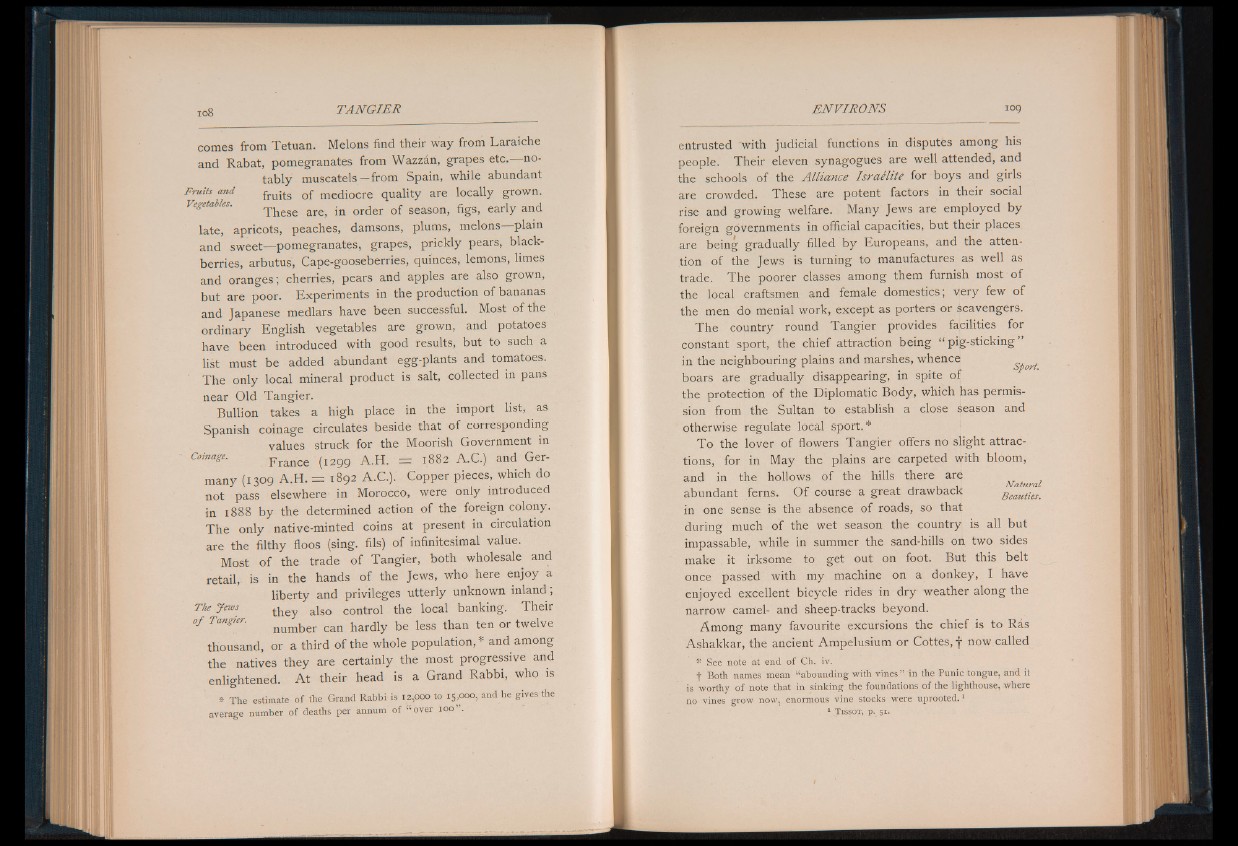
comes from Tetuan. Melons find their way from Laraiche
and Rabat, pomegranates from Wazzan, grapes etc.— notably
muscatels—from Spain, while abundant
Fruits and of mediocre quality are locally grown.
These are, in order of season, figs, early and
late, apricots, peaches, damsons, plums, melons— plain
and sweet— pomegranates, grapes, prickly pears, blackberries,
arbutus, Cape-gooseberries, quinces, lemons, limes
and oran ge sch e r rie s , pears and apples are also grown,
but are poor. Experiments in the production of bananas
and Japanese medlars have been successful. Most of the
ordinary English vegetables are grown, and potatoes
have been introduced with good results, but to such a
list must be added abundant egg-plants and tomatoes.
The only local mineral product is salt, collected in pans
near Old Tangier.
Bullion takes a high place in the import list, as
Spanish coinage circulates beside that of corresponding
values struck for the Moorish Government in
Coinage. France (i 299 A.H. — 1882 A.C.) and Germany
(1309 A.H. U 1892 A.C.). Copper pieces, which do
not pass elsewhere in Morocco, were only introduced
in 1888 by the determined action of the foreign colony.
The only native-minted coins at present in circulation
are the filthy floos (sing, fils) of infinitesimal value.
Most of the trade of Tangier, both wholesale and
retail, is in the hands of the Jews, who here enjoy a
liberty and privileges utterly unknown inland,
The yews they alsQ controi the local banking. Their
O f Tangier. number can hardly be less than ten or twelve
thousand, or a third of the whole population, * and among
the natives they are certainly the most progressive and
enlightened. A t their head is a Grand Rabbi, who is
* The estimate of the Grand Rabbi is 12,0c» to 15,000, and he gives the
average number of deaths per annum of “ over 100” .
entrusted "with judicial functions in disputés among his
people. Their eleven synagogues are well attended, and
the schools of the Alliance Israélite for boys and girls
are crowded. These are potent factors in their social
rise and growing welfare. Many Jews are employed by
foreign governments in official capacities, but their places
are being gradually filled by Europeans, and the attention
of the Jews is turning to manufactures as well as
trade. The poorer classes among them furnish most of
the local craftsmen and female domestics; very few of
the men do menial work, except as porters or scavengers.
The country round Tangier provides facilities for
constant sport, the chief attraction being “ pig-sticking”
in the neighbouring plains and marshes, whence ^
boars are gradually disappearing, in spite of
the protection of the Diplomatic Body, which has permission
from the Sultan to establish a close season and
otherwise regulate local sport. *
To the lover of flowers Tangier offers no slight attractions,
for in May the plains are carpeted with bloom,
and in the hollows of the hills there are
_ _ . i l l Natural
abundant ferns. Of course a great drawback Beauties.
in one sense is the absence of roads, so that
during much of the wet season the country is all but
impassable, while in summer the sand-hills on two sides
make it irksome to get out on foot. But this belt
once passed with my machine on a donkey, I have
enjoyed excellent bicycle rides in dry weather along the
narrow camel- and sheep-tracks beyond.
Among many favourite excursions the chief is to Ras
Ashakkar, the ancient Ampelusium or Cottes, f now called
* See note at end of Ch. iv.
f Both names mean “ abounding with vines ” in the Punic tongue, and it
is worthy of note that in sinking the foundations of the lighthouse, where
no vines grow now, enormous vine stocks were uprooted.1
1 T is s o t , p . 51.